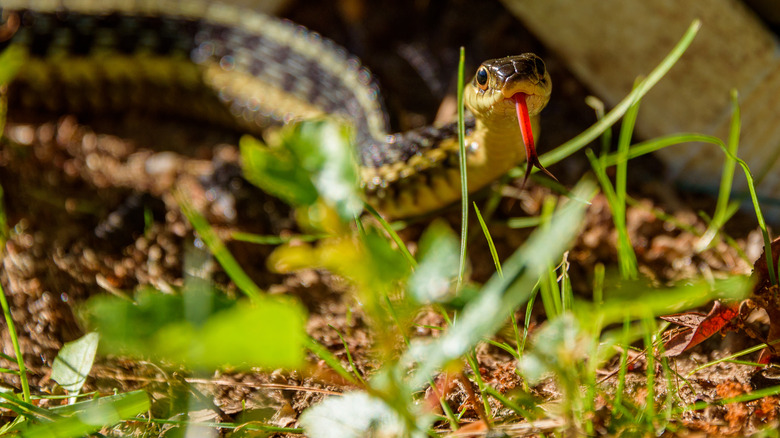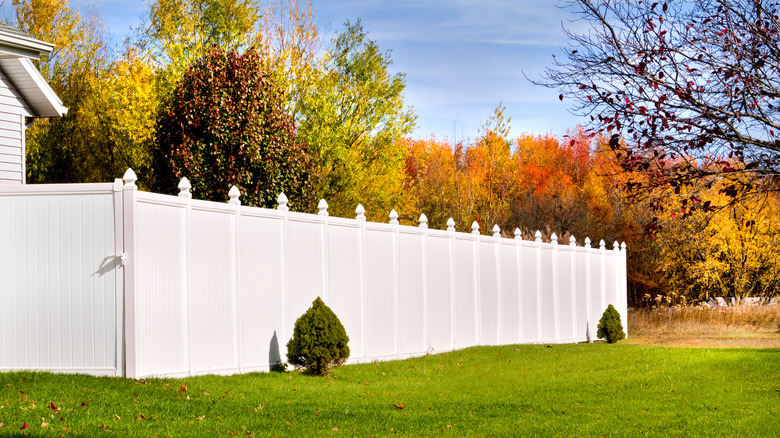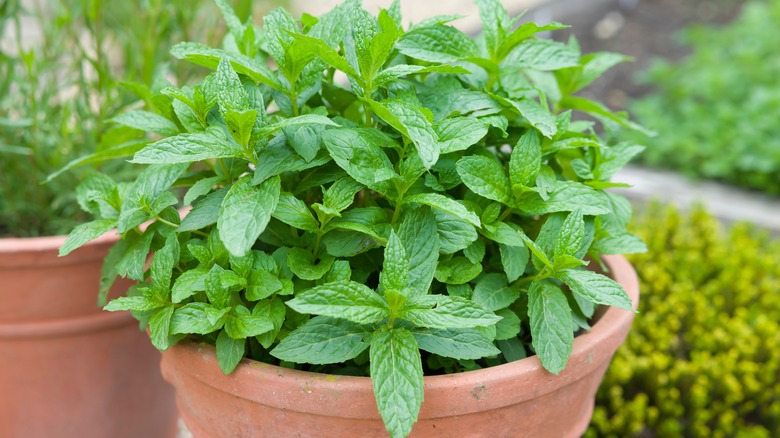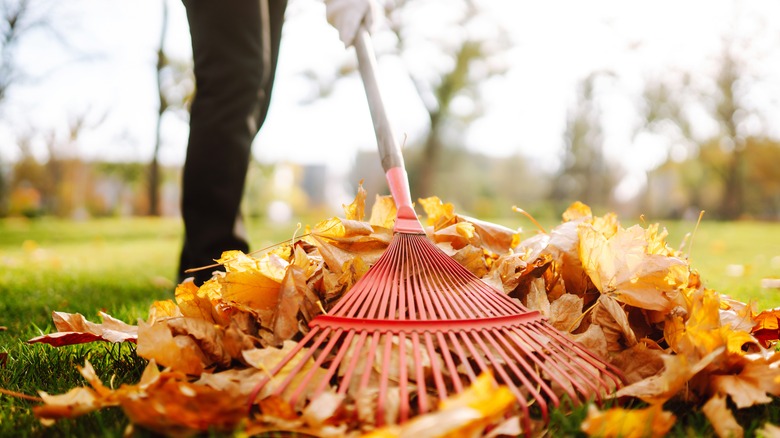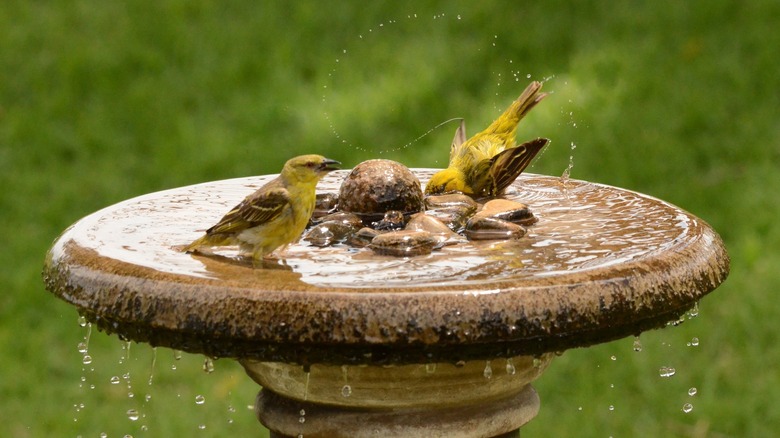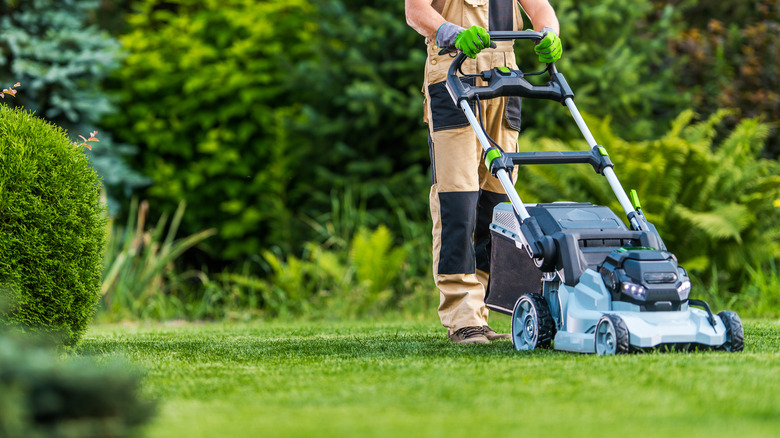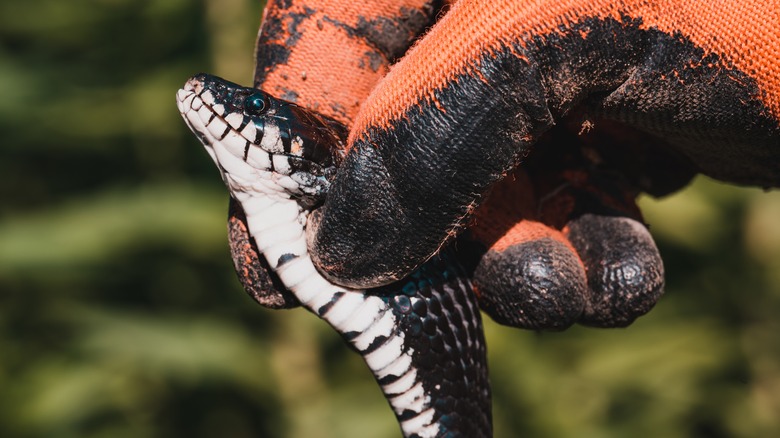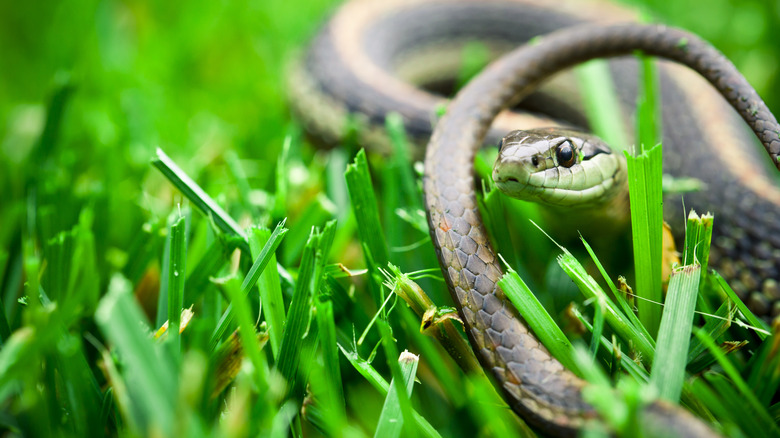Mistakes Everyone Makes When Trying To Get Rid Of Snakes In Their Yard
Snakes are unique in their ability to conjure up either love or intense hatred. Regardless of your personal feelings about these fascinating reptiles, chances are you don't want to have an influx of snakes hanging out in your yard all the time. Most often, snakes are harmless, and you may find an occasional garden variety hiding out when you're pruning bushes or doing some other form of outdoor maintenance. If you see more than an occasional snake, however, you may need to call an expert to help remove them, as there might be something in your yard that's attracting them.
While you might already maintain your yard, prune your trees and bushes, and keep junk out of your outdoor spaces more generally, these steps alone may not be enough to keep snakes out. There are numerous short-term and long-term mistakes people commonly make when they're trying to eliminate snakes from their yards.
Using commercial snake repellants
While you might be more familiar with traditional bug sprays and other pest repellants, commercial snake repellant is an actual product. In fact, many home supply stores have a number of different commercial snake products in their pest control aisles. However, Utah State University does not recommend the use of snake repellants for a couple of reasons. For one, these don't really work, which means that they're ultimately just a waste of money. In particular, the university points out that sulfur, a common snake-repellant ingredient, is ineffective. Homeowners have resorted to other types of pest control products in an effort to control snakes, including mothballs and sticky traps. However, Utah State University points out that not only are these products not meant for outdoor use, but they can put your family, pets, and other wildlife at risk.
Instead, it's best to stick with more "natural" forms of snake control. This doesn't mean you have to waste money on any commercial products, though. The key is to help maintain your yard and possibly add barriers that could repel snakes, so they won't find the outside of your home quite so enticing.
Attempting to use garden tools or other weapons against snakes
When you encounter a snake, your safety instincts might kick in, and you might be tempted to try to get rid of the unwanted lawn visitor yourself. In fact, some people have been known to use shovels, hoes, and even guns as a means to eliminate snakes from their yards. Before you act on such impulses, though, consider the fact that not only is such an action inhumane as far as the snake is concerned, but you might inadvertently hurt yourself and other family members, too. For example, bullets can hit the ground and bounce back toward you, or you might accidentally cut your foot or leg with a shovel when attempting to hit a snake.
Rather than killing the snake and causing accidental harm to yourself and others, consider a more humane approach. If you want to give a snake a hint, consider spraying it with a garden hose instead. This will certainly be off-putting to any reptile that slithers into your yard, and will likely cause them to retreat to another place instead.
Failing to use snake-repelling fencing
Instead of using commercial pest control products or weapons against snakes, consider ways you can create barriers against these reptiles to discourage them from making a home in your yard. One such method is installing a snake-repelling fence. While snakes can still technically slither over a fence, they're less likely to put in the effort of making the climb compared to hiding in grass to enter your yard. Plus, climbing up a fence could make them more visible to predators such as large birds.
A fence in itself can act as a deterrent, but to really make an impact, you'll want to install a style of fence that's least likely to encourage snakes to claim them. Utah State University recommends using a ¼-inch thick mesh or sheeting, and making sure that the fence extends a few inches into the ground. Another consideration is the material of the fence itself. For example, snakes are less likely to cross over vinyl fencing because there are no openings that they can sneak into. You'll also want to ensure that no plants or tree limbs hang over your fence, as these can be easy spots for snakes to climb over.
Not using snake-repelling plants in your garden
While cleaning up your yard and putting up a fence is a good first step in deterring snakes, you might also be tempted to keep all vegetation out of your yard. While it's true that snakes can easily climb trees and bushes that hang over a fence, you could be making a mistake if you have frequent snakes visiting your yard and you don't have certain plants in your garden that could otherwise repel them.
If you have any kitchen herbs or certain plants that you keep inside your house, it may be time to consider moving some of these natural ingredients outdoors to help repel snakes. In particular, many pests don't care for strong scents. For example, snakes are known to not care for plants from the mint family, lemongrass, and eucalyptus. They also despise marigold flowers because of their sulfur-like scents. If you regularly grow basil or sage in your house, you can also consider planting these outdoors to keep snakes out of your yard. Finally, snakes don't like onions or garlic, due to naturally-containing sulfonic acid. If you aren't up for planting bulbs of onion or garlic, however, you can instead chop up small amounts of each and place them around rock beds as a natural — though strong-smelling — snake repellant.
Having piles of leaves or wood in your yard
After a hard day's work in your yard, it can be tempting to leave piles of debris to deal with another day. But just as snakes like slithering across grasses, they also love hiding out in protected places due to their aversion to staying out in the open. Chances are one of these reptiles may consider a pile of leaves or twigs as the perfect place to take shelter. The same goes for other types of debris you might have condensed in piles, such as metal, bricks, rocks, or branches. Not only do snakes like to hide in them from predators, but they also often find some of their prey here, as these often work as hiding spots for rodents like mice and rats.
Instead of leaving piles of branches or leaves from yard work at the end of the day, make sure you clean these up and dispose of them properly. You can even buy yard and garden bags from your home supply store, many of which can hold up to 30 gallons of yard debris at a time. As for other types of debris you cannot dispose of immediately, such as rocks, wood, and bricks, consider flattening out these piles to make them less desirable for snakes (and their prey) to take shelter in, and remove them as soon as you can. Also, be sure to handle these materials carefully in case wildlife decides to hide in them.
Leaving pet food bowls outside
As the weather warms up, you might be tempted to leave bowls of food for your pets if they like to hang out in the yard with you. While a bowl of water is a necessity for keeping dogs hydrated when outdoors, food should be off-limits in your yard. The food doesn't directly attract snakes. Instead, the culprits are the insects and rodents that might be attracted to the pet food, which then become sources of prey for snakes. The same goes for feeding outdoor cats. While felines can be a deterrent to snakes, the food will still attract other wildlife the reptiles might hang around to feed on. Bird food is yet another potential attraction for rodents and subsequent predators.
The best method is to keep all pet food bowls indoors. If you do need to feed pets outside, be sure to do so during the day only, when rodents are less likely to be hanging out in the open. Also be sure to clean up all food messes at the end of each day, and store all of your pet food in tightly sealed containers to prevent insect and rodent invasions from also attracting snakes to your yard.
Not maintaining any water sources you might have in your yard
Water features, whether human-installed or naturally occurring, can make beautiful additions to your home. These include birdbaths, waterfalls, pools, ponds, and lakes. In turn, wildlife may also use such water sources for their basic survival. This, of course, includes snakes, as well as birds, rodents, frogs, and other creatures snakes might eat.
While you can't necessarily control all sources of water around your home, there are a few areas you can maintain in your yard area to help prevent snakes from hanging out in your outdoor spaces. First, if you have a birdbath, make sure it's kept clean and away from any hiding spots snakes might like to take shelter in, such as tree branches or bushes. Preferably, these should also be raised from the ground and kept away from your house. If you live near a pond or lake, consider creating a barrier with a fence, and be sure to maintain any grasses and plants near them. Finally, if you have an outdoor pool, ensure it is well-maintained and cleaned so that snakes won't want to go near it.
Not mowing your lawn enough to keep the grass short
By now, you know that snakes love hiding to take shelter from predators and also sneak up on their prey. As such, snakes are especially fond of taller grasses where other wildlife can't spot them so easily. So if you're not mowing often enough, snakes may be tempted to enter your yard as an ideal hiding space from predators.
To help prevent your grass from getting out of control and attracting snakes, it's important to come up with a plan for regular lawn care. Much of this depends on the time of year and the type of grass you have. For example, grass tends to grow quickest in the warm spring and early summer months, which means you might need to mow your lawn more often these times of the year. In terms of length, the shorter you can keep your grass, the less likely snakes will be attracted to your lawn.
Assuming a snake is harmless and removing it by hand
Garden snakes are common, and are usually more of a nuisance than actually harmful. According to the Ohio State University, the most common snakes that inhabit yards and gardens are garter snakes, which also happen to not be dangerous for humans. Due to their ubiquity in home gardens, this species also has the nickname of "garden snake." While touching this snake isn't deadly, handling snakes in the wild is never recommended. Also, you should not assume that a snake you encounter is safe, as there are venomous snakes that still like to show up in home gardens from time to time.
In actuality, few snakes are dangerous. However, if you do encounter a snake in your yard or garden, the best strategy is to let it be. Snakes are just as afraid of humans as people are of them, and they will likely slither away if they are found. Avoid trying to remove a snake on your own to ensure the safety of all parties involved.
Assuming that you can repel all snakes for good
Most snakes are harmless, though they can become a nuisance for some gardens and their homeowners. Still, snakes are a fact of life outdoors, so while you can help repel them from your yard to some extent, it's a mistake to assume that you can prevent every snake from ever entering your property. As with other wildlife, snakes are simply a fact of life, and no plant, fence, or careful yard maintenance is guaranteed to be 100% fool-proof (snakes did indeed survive the dinosaurs, after all).
Aside from doing the best you can to minimize the presence of unwanted reptiles in your yard, there are also some benefits of snakes to consider. Among these include natural pest and rodent control, as snakes prey on insects and arachnids such as grasshoppers and ticks, as well as small rodents like mice and rats. As with anything, moderation is key here. Just as snakes can get rid of other unwanted species around the outside of your home, you can still utilize some of the above tips to make sure that their presence in your yard stays in check. If all else fails, consider contacting a pest control professional to take care of snake problems.
